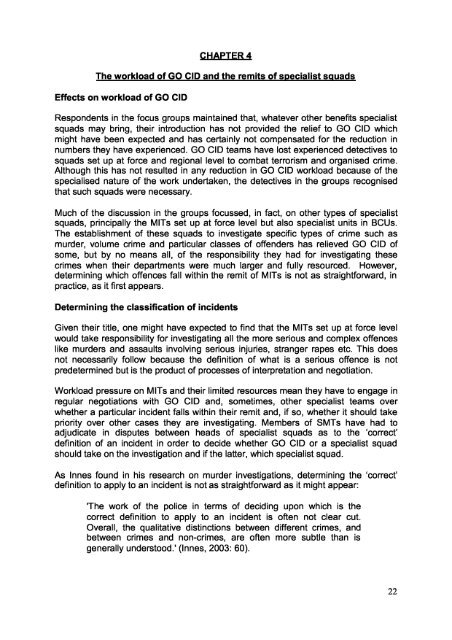LOSING THE DETECTIVES: VIEWS FROM THE ... - Police Federation
LOSING THE DETECTIVES: VIEWS FROM THE ... - Police Federation
LOSING THE DETECTIVES: VIEWS FROM THE ... - Police Federation
You also want an ePaper? Increase the reach of your titles
YUMPU automatically turns print PDFs into web optimized ePapers that Google loves.
CHAPTER 4<br />
The workload of GO CID and the remits of s pecialist squads<br />
Effects on workload of GO CID<br />
Respondents in the focus groups maintained that, whatever other benefits specialist<br />
squads may bring, their introduction has not provided the relief to GO CID which<br />
might have been expected and has certainly not compensated for the reduction in<br />
numbers they have experienced. GO CID teams have lost experienced detectives to<br />
squads set up at force and regional level to combat terrorism and organised crime.<br />
Although this has not resulted in any reduction in GO CID workload because of the<br />
specialised nature of the work undertaken, the detectives in the groups recognised<br />
that such squads were necessary.<br />
Much of the discussion in the groups focussed, in fact, on other types of specialist<br />
squads, principally the MITs set up at force level but also specialist units in BCUs.<br />
The establishment of these squads to investigate specific types of crime such as<br />
murder, volume crime and particular classes of offenders has relieved GO CID of<br />
some, but by no means all, of the responsibility they had for investigating these<br />
crimes when their departments were much larger and fully resourced. However,<br />
determining which offences fall within the remit of MITs is not as straightforward, in<br />
practice, as it first appears.<br />
Determining the classification of incidents<br />
Given their title, one might have expected to find that the MITs set up at force level<br />
would take responsibility for investigating all the more serious and complex offences<br />
like murders and assaults involving serious injuries, stranger rapes etc. This does<br />
not necessarily follow because the definition of what is a serious offence is not<br />
predetermined but is the product of processes of interpretation and negotiation.<br />
Workload pressure on MITs and their limited resources mean they have to engage in<br />
regular negotiations with GO CID and, sometimes, other specialist teams over<br />
whether a particular incident falls within their remit and, if so, whether it should take<br />
priority over other cases they are investigating. Members of SMTs have had to<br />
adjudicate in disputes between heads of specialist squads as to the ‘correct’<br />
definition of an incident in order to decide whether GO CID or a specialist squad<br />
should take on the investigation and if the latter, which specialist squad.<br />
As Innes found in his research on murder investigations, determining the ‘correct’<br />
definition to apply to an incident is not as straightforward as it might appear:<br />
'The work of the police in terms of deciding upon which is the<br />
correct definition to apply to an incident is often not clear cut.<br />
Overall, the qualitative distinctions between different crimes, and<br />
between crimes and non-crimes, are often more subtle than is<br />
generally understood.' (Innes, 2003: 60).<br />
22
















